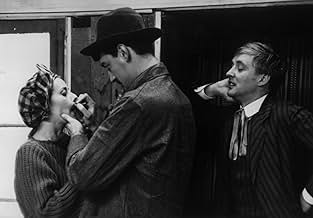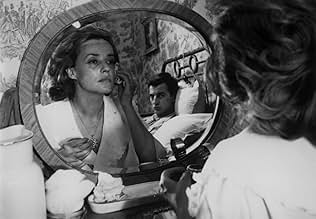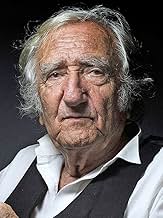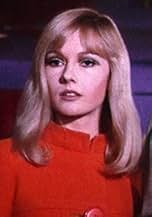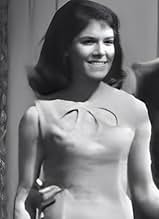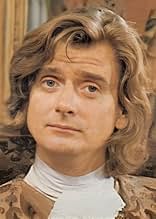VALUTAZIONE IMDb
7,7/10
46.191
LA TUA VALUTAZIONE
Decenni di un triangolo amoroso che riguarda due amici e una donna impulsiva.Decenni di un triangolo amoroso che riguarda due amici e una donna impulsiva.Decenni di un triangolo amoroso che riguarda due amici e una donna impulsiva.
- Regia
- Sceneggiatura
- Star
- Nominato ai 2 BAFTA Award
- 3 vittorie e 4 candidature totali
Oskar Werner
- Jules
- (as Oscar Werner)
Serge Rezvani
- Albert
- (as Bassiak)
Michel Subor
- Récitant
- (voce)
- …
Danielle Bassiak
- Compagnon d'Albert
- (non citato nei titoli originali)
Elen Bober
- Mathilde
- (non citato nei titoli originali)
Pierre Fabre
- Ivrogne in Cafe'
- (non citato nei titoli originali)
Dominique Lacarrière
- Une des femmes
- (non citato nei titoli originali)
Bernard Largemains
- Merlin
- (non citato nei titoli originali)
Kate Noelle
- Birgitta
- (non citato nei titoli originali)
Jean-Louis Richard
- Cliente au Cafe'
- (non citato nei titoli originali)
Michel Varesano
- Cliente au Cafe'
- (non citato nei titoli originali)
Christiane Wagner
- Helga
- (non citato nei titoli originali)
Recensioni in evidenza
Whenever a commentator declares outright that a film is a complete waste of time and that nobody, BUT NOBODY, should ever watch it, I tend to peg that commentator as an opinionated ass. So I would never say that about a well-respected film like "Jules and Jim." But quite honestly, I can't warm up to it. I've watched it on more than one occasion over the years, and it never fails to put me to sleep at both ends of my anatomy. I've just viewed a DVD edition in which a film scholar clearly explains his views on the fascination of "Jules and Jim." But I still couldn't see why the relationship of these three tedious characters, discussed and analyzed in all its very tedious minutiae by those same characters and an off-screen narrator (also tedious), should interest me. It's certainly beloved by academic types (maybe for those very same characteristics?), and film critics eat it up like it has gravy on it. Like another commentator, I'm a bit puzzled by all the comments about its lyrical, lighthearted and idyllic qualities. I'm left with the impression of a rather dry, academic dissertation on the complexities of male-female relationships ca. 1961 (the 1910 setting seems to me immaterial to the script).
I can't help feeling that I'm missing something, and I'm not averse to French films, but they're usually older, pre-new-wave films, for example "Forbidden Games," "French Can-Can," or Pagnol's "Fanny" trilogy. I take it that the sentimentality of such films is one of the things new wave directors reacted against. If so, I can't jump on their bandwagon, try as I might. I've enjoyed some of Truffaut's work, but not this, I'm afraid.
To those who love and appreciate "Jules and Jim" -- have pleasure of it. I envy you for that, and maybe I'll try it again in a few years.
I can't help feeling that I'm missing something, and I'm not averse to French films, but they're usually older, pre-new-wave films, for example "Forbidden Games," "French Can-Can," or Pagnol's "Fanny" trilogy. I take it that the sentimentality of such films is one of the things new wave directors reacted against. If so, I can't jump on their bandwagon, try as I might. I've enjoyed some of Truffaut's work, but not this, I'm afraid.
To those who love and appreciate "Jules and Jim" -- have pleasure of it. I envy you for that, and maybe I'll try it again in a few years.
Those with heavy sensibilities along the lines of conventional "morality" seem to have a hard time allowing themselves to enjoy this film for what it is: A beautiful visual poem about the passing of time and the progression and growth of an unusual friendship. This friendship may be unusual but feels completely natural and true. Jules and Jim if anything, exhibit great maturity in their relationship with each other and Catherine. It's refreshing to see a film dealing with a deep love, friendship and emotional bond between two males and a mutual love for a woman, without the usual competitiveness and controlling possessiveness that is the norm. Jules and Jim come off more as an enlightened pair. It seems understood among them there is no real belonging of one human being to another. Catherine's whims of the heart are discussed between them at every stage throughout the film and they are willing to accept them and love her for who she is as well as each other.
I do feel that this film lost it's pacing toward the end and seemed to speed up to conclusion. That being it's only flaw. Visually it is stunning. Francois Truffaut was a poet with the camera and his subtle nuances are captivating. The scenes of Jules, Jim and Catherine enjoying days together seem so natural and evoke the feel of wonderful days spent together among best friends that transported me back to days gone by.
"we met with a kiss/ a hit, then a miss/ and we parted/ we went our own ways/ in life's whirlpool of days/ around and around we go/ together bound/ together bound."
I do feel that this film lost it's pacing toward the end and seemed to speed up to conclusion. That being it's only flaw. Visually it is stunning. Francois Truffaut was a poet with the camera and his subtle nuances are captivating. The scenes of Jules, Jim and Catherine enjoying days together seem so natural and evoke the feel of wonderful days spent together among best friends that transported me back to days gone by.
"we met with a kiss/ a hit, then a miss/ and we parted/ we went our own ways/ in life's whirlpool of days/ around and around we go/ together bound/ together bound."
Jules et Jim is a difficult film, there's no question about that. I'd say the only thing that kept me watching was my love of Truffaut his ingenuity in cinematography, dialogue and just the whole tone of the film. That he could keep such melodramatic (if not drab) stuff somewhat entertaining is a testament to his mastery of the medium. I loved the blending of historical film into the narrative; I don't know if he was the first person to do this I highly doubt it but he certainly did it well in this picture.
Jules et Jim is a study of capriciousness. Catherine a woman to whom monogamy seems like a foreign concept is, to paraphrase the film, `not particularly intelligent, beautiful or kind, but she's treated like a queen.' Why Jules and Jim love her so, I don't know. They seem like strong enough characters to be without such a difficult woman, but I guess that question is at the center of the film.
For some reason, Jules et Jim reminded me of L'Avventura by Antonioni maybe because it was also a hard movie to enter and because the characters were so inaccessible. There are certainly elements of the neo-realism in this film, (one need look no further than the extensive use of mist and the forest scenes that closely resemble the dream sequences of Fellini, De Sica, et. al.)
Overall, I would say this picture is worthwhile, although there are certainly better, more accessible and mature Truffaut films out there.
Jules et Jim is a study of capriciousness. Catherine a woman to whom monogamy seems like a foreign concept is, to paraphrase the film, `not particularly intelligent, beautiful or kind, but she's treated like a queen.' Why Jules and Jim love her so, I don't know. They seem like strong enough characters to be without such a difficult woman, but I guess that question is at the center of the film.
For some reason, Jules et Jim reminded me of L'Avventura by Antonioni maybe because it was also a hard movie to enter and because the characters were so inaccessible. There are certainly elements of the neo-realism in this film, (one need look no further than the extensive use of mist and the forest scenes that closely resemble the dream sequences of Fellini, De Sica, et. al.)
Overall, I would say this picture is worthwhile, although there are certainly better, more accessible and mature Truffaut films out there.
Time and revisionist critics have tried to tarnish the gleam of Truffaut's final masterpiece - citing its apparent misogyny and apoliticism; but for some of us, 'Jules et Jim' is the unforgettable film that opened the gates to both European film, and the great masters of American cinema like Hitchcock, Hawks and Ray.
'Jules et Jim' is, along with 'Citizen Kane', THE vindication of the pleasures of cinematic form: the first half especially, in its rush of narrative registers and technical exuberance, is unparalleled in modern film. This isn't mere trickery - the use of paintings, books, plays, dreams, conversations, documentary footage, etc., as well as the different ways of telling a story through film, all point to the movie's theme - how do you represent people and the world in art without destroying them? Or is art the only to save people and life from extinction?
The foregrounding of theatricality, acting, disguises, pseudonyms, games, works-within-the-work, all point to the high modernism in which the film is set, when the old certainties about identity and place were being destroyed by the Great War. In fact the film could be considered Cubist in the way it uses film form to splice up and rearrange images, space, characters, viewpoints.
Truffaut's film is a beautiful elegy about time: the historical time heading towards destruction in the shape of the Nazis, and the circular time of love, obsession and art. These times struggle in the film's structure, history zipping past years in the framing, Parisian sections, and days stretching out interminably in the central rural rondelay.
Far from being misogynistic, the film places Catherine's speech about 'grains of sand' at its philosophical heart. AND she's played by Jeanne Moreau, the most honest and human of all great actresses.
'Jules et Jim' is, along with 'Citizen Kane', THE vindication of the pleasures of cinematic form: the first half especially, in its rush of narrative registers and technical exuberance, is unparalleled in modern film. This isn't mere trickery - the use of paintings, books, plays, dreams, conversations, documentary footage, etc., as well as the different ways of telling a story through film, all point to the movie's theme - how do you represent people and the world in art without destroying them? Or is art the only to save people and life from extinction?
The foregrounding of theatricality, acting, disguises, pseudonyms, games, works-within-the-work, all point to the high modernism in which the film is set, when the old certainties about identity and place were being destroyed by the Great War. In fact the film could be considered Cubist in the way it uses film form to splice up and rearrange images, space, characters, viewpoints.
Truffaut's film is a beautiful elegy about time: the historical time heading towards destruction in the shape of the Nazis, and the circular time of love, obsession and art. These times struggle in the film's structure, history zipping past years in the framing, Parisian sections, and days stretching out interminably in the central rural rondelay.
Far from being misogynistic, the film places Catherine's speech about 'grains of sand' at its philosophical heart. AND she's played by Jeanne Moreau, the most honest and human of all great actresses.
Although "Jules and Jim" was made over 40 years ago and takes place 40 to 50 years before that, the amazing thing is that it barely seems to have dated. Because it focuses on the universal human relationships between its characters, rather than the specific time in which they live, it's the rare film set in the past that doesn't feel like a "period film." And, especially in the first half of the movie, Truffaut's New Wave techniques lend a remarkable energy and freshness.
The movie explores friendship and love among three semi-bohemian types: Parisian Jim (Henri Serre), Austrian Jules (Oskar Werner), and Catherine (Jeanne Moreau), the beautiful, free-spirited woman whom they both love. She's the most vibrant character in the movie, and impossible to pin down. It's never clear who she lovesshe contradicts herself repeatedly, and perhaps loves no one but herselfor whether she's diabolical or simply misunderstood. Moreau nearly steals the movie, if not for the fact that the title reminds us to focus on the relationship between the two men, and that Serre and Werner give good performances too. Even if Jim and Jules aren't as mysterious as Catherine, they're complex and interesting characters in their own right.
The story plays out rather episodically, which means "Jules and Jim" is full of wonderful little moments, often involving the crazy things Catherine does. Some of my favorites include her dressing up as a man and racing Jules and Jim across a bridge; her jumping into the Seine in frustration; and her singing the movie's charming theme song, "The Whirlpool of Life." The episodes are linked together by surprisingly unobtrusive off-screen narration, which keeps the film moving along rather than slowing it down.
"Jules and Jim" does get a little tiresome toward the end, with Catherine continually vacillating between the men in her life, Jim vacillating between Catherine and his old girlfriend Gilberte, and Jules remaining loyally devoted to Catherine despite how foolish this may seem. However, the movie is redeemed by its tragic final scenes, which poignantly contrast with the carefree gaiety of the beginning. Jules, Jim, and Catherine are caught in a destructive spiral, tossed and defeated by the whirlpool of life. Still, the tone of the movie is gentle and human, not pessimistic. Truffaut considered "Jules and Jim" a "hymn to life," and it is most memorable as a vivid celebration of friendship and youthful possibility, even as it acknowledges how those things can sour.
The movie explores friendship and love among three semi-bohemian types: Parisian Jim (Henri Serre), Austrian Jules (Oskar Werner), and Catherine (Jeanne Moreau), the beautiful, free-spirited woman whom they both love. She's the most vibrant character in the movie, and impossible to pin down. It's never clear who she lovesshe contradicts herself repeatedly, and perhaps loves no one but herselfor whether she's diabolical or simply misunderstood. Moreau nearly steals the movie, if not for the fact that the title reminds us to focus on the relationship between the two men, and that Serre and Werner give good performances too. Even if Jim and Jules aren't as mysterious as Catherine, they're complex and interesting characters in their own right.
The story plays out rather episodically, which means "Jules and Jim" is full of wonderful little moments, often involving the crazy things Catherine does. Some of my favorites include her dressing up as a man and racing Jules and Jim across a bridge; her jumping into the Seine in frustration; and her singing the movie's charming theme song, "The Whirlpool of Life." The episodes are linked together by surprisingly unobtrusive off-screen narration, which keeps the film moving along rather than slowing it down.
"Jules and Jim" does get a little tiresome toward the end, with Catherine continually vacillating between the men in her life, Jim vacillating between Catherine and his old girlfriend Gilberte, and Jules remaining loyally devoted to Catherine despite how foolish this may seem. However, the movie is redeemed by its tragic final scenes, which poignantly contrast with the carefree gaiety of the beginning. Jules, Jim, and Catherine are caught in a destructive spiral, tossed and defeated by the whirlpool of life. Still, the tone of the movie is gentle and human, not pessimistic. Truffaut considered "Jules and Jim" a "hymn to life," and it is most memorable as a vivid celebration of friendship and youthful possibility, even as it acknowledges how those things can sour.
Lo sapevi?
- QuizHenri-Pierre Roché's original novel was based on his own experiences as a young man. The original Catherine was still alive when the film was released and even attended the premiere incognito.
- BlooperWhen Catherine lights the letters on fire, they are at first away from her dress, but in the next shot they are burning on top of her dress.
- Versioni alternativeThe Criterion Region 1 disc and the Tartan Region 2 DVD have a scene in which the film is reversed left/right. When Jules, Jim, and Albert are sitting on the grass sharing stories about the war, the order of the three characters repeatedly changes between shots. This does not occur in other DVD releases of this film, including the Fox/Lorber Region 1 release.
- ConnessioniEdited into Laggiù qualcuno mi ama (2023)
I più visti
Accedi per valutare e creare un elenco di titoli salvati per ottenere consigli personalizzati
- How long is Jules and Jim?Powered by Alexa
Dettagli
- Data di uscita
- Paese di origine
- Lingue
- Celebre anche come
- Jules and Jim
- Luoghi delle riprese
- Aziende produttrici
- Vedi altri crediti dell’azienda su IMDbPro
Botteghino
- Lordo Stati Uniti e Canada
- 509 USD
- Fine settimana di apertura Stati Uniti e Canada
- 11.206 USD
- 25 apr 1999
- Lordo in tutto il mondo
- 497.778 USD
- Tempo di esecuzione
- 1h 45min(105 min)
- Colore
- Mix di suoni
- Proporzioni
- 2.35 : 1
Contribuisci a questa pagina
Suggerisci una modifica o aggiungi i contenuti mancanti

![Guarda Bande-annonce [OV]](https://m.media-amazon.com/images/M/MV5BMWM5OGI0MjUtZDRhMC00ZGQ1LTk0NWEtMWMzZDFhMjA1OTk1XkEyXkFqcGdeQXRodW1ibmFpbC1pbml0aWFsaXplcg@@._V1_QL75_UX500_CR0)
